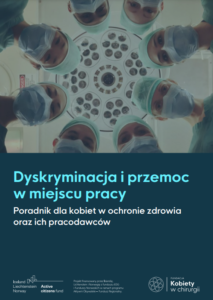Project: Sharp cut against discrimination
Area 1. Human rights protection (including gender equality)
“We are women, mothers, doctors, nurses and midwives. We love our work. We want our passion to be able to develop in a professional, conducive and supportive environment. (…) We want to mobilise women to get involved in the process of change in Polish medicine,” say the founders of the Women in Surgery Foundation.
We matter!
It started with a survey. Approx. 500 doctors, nurses and midwives – women working in surgical specialties – took part in it. The results were shocking: as many as 90% of the respondents had experienced discrimination in their workplace. At the same time, almost half of the respondents expected the Foundation to provide them with legal help and support in counteracting discrimination and violence in the workplace. The project “Sharp cut against discrimination” was a response to this need.
How discrimination against women in surgical specialities manifests itself?
This is shown by the specific statements of the women participating in the survey:
– The director (…) addresses female resident doctors as “girls” at official meetings.
– Bonuses for overlimited services only for doctors, not for nurses.
And what happens when a boundary is set?
– Saying ‘stop’ means condemning oneself to being pushed away from the operating table. I objected once in a trivial matter and the punishment was severe.
– We were repeatedly removed from the operating plan in favour of administrative activities.
What does this mean? “It means that the girls were doing discharges, descriptions or other things related to the paperwork, instead of going to the operating theatre”, explains Malgorzata Nowosad, president of the Women in Surgery Foundation. And she asks: “How do you implement anti-bullying, anti-discrimination systems in hospitals? The question is not whether the hospital has such system, but to what extent it is effective and to what extent – in fact – it works. […] To make sure that it is not some piece of paper with a procedure, kept somewhere in a binder, but this support is real”.
A guide for women in health care and their employers
As part of the project, an anti-discrimination guidebook was produced, with the specifics of working in the health professions taken into account. It provides key definitions and answers to two important questions: how to recognise discrimination and violence in the workplace and how to react when experiencing violence or discrimination.
“By opposing violence, which means reporting complaints and taking cases to court we set precedents that encourage more people to oppose violence,” writes Marta Musiejewska, board member of the Women in Surgery Foundation.
The system has holes
The Foundation’s activities have gone beyond those related to anti-discrimination education. Medical women working in surgical specialties experiencing discrimination, harassment or bullying could also benefit from free legal and psychological consultations. The support system in these two areas, too, is inept. Psychological support is guaranteed to firefighters or police officers, but not to medics.
“And our work is very demanding, a job that leaves a very large mark on the psyche, and this support is certainly very important. We need to think today, systemically, about how to provide such support,” adds Małgorzata Nowosad.
Management culture in medicine
The conference under this title was an opportunity for discussion and summaries. To participate in the conference, the organisers invited female and male medical professionals, including those working in managerial positions, as well as NGO management teams and representatives of related organisations dealing with the problem of inequality in the medical labour market in Poland.
The project’s website: https://kobietywchirurgii.pl/projekty/ostre-ciecie-przeciwko-dyskryminacji/
Recording of the ‘Management culture in medicine’ conference
An anti-discrimination guide for women in health care and their employers

